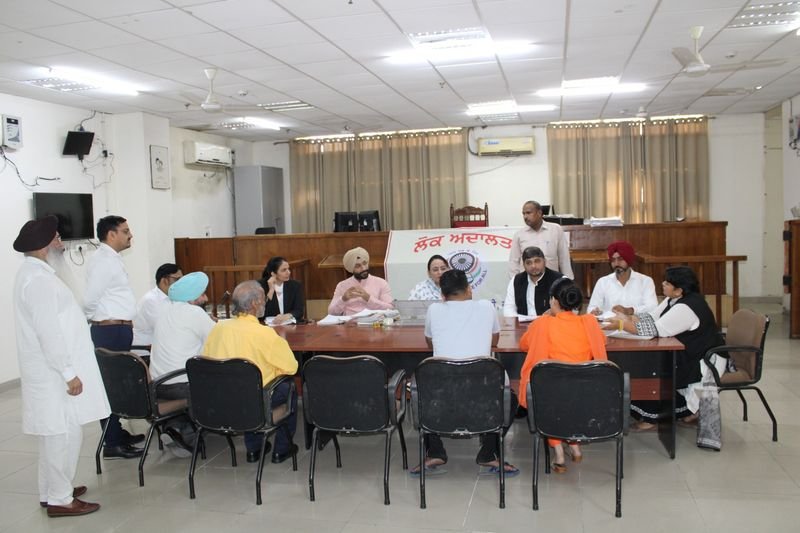Incredible Success: How National Lok Adalat Case Settlements Are Transforming Justice
In a bustling district court in New Delhi, an air of optimism envelops the room as the National Lok Adalat case settlements unfold. What began as a simple initiative to reduce the backlog of cases has evolved into a beacon of hope for countless citizens seeking justice. Across the nation, these Lok Adalats, or people’s courts, have emerged as a powerful tool in addressing legal disputes, offering a platform for quick and amicable resolutions that are accessible to all. As families gather with their legal representatives, the spirit of resolution fills the atmosphere, showcasing how alternative dispute resolution mechanisms can foster harmony within society.
The National Lok Adalat system, established under the Legal Services Authorities Act of 1987, has its roots in the idea that justice should not only be delivered but also be accessible to everyone, irrespective of their socio-economic status. The concept has resonated deeply across India, with lawyers and litigants alike recognizing the importance of efficient case settlements. The Lok Adalat sessions are organized at various levels, from the district courts to the Supreme Court, and serve as a driving force to alleviate the pressure on the traditional judicial system.
As the clock ticks towards the start of the session, a palpable sense of anticipation hangs in the air. Participants, many of whom have waited years for their day in court, now face a unique opportunity. The National Lok Adalat case settlements offer an informal setting where adversaries can come together, often resulting in timely resolutions that leave both parties feeling heard and satisfied. This is a stark contrast to the lengthy and often stressful litigation process that can drag on for months or even years.
One of the most compelling aspects of the National Lok Adalat case settlements is their ability to cater to a diverse range of disputes. From family law issues such as child custody and divorce to civil matters, including property disputes and consumer grievances, the scope is broad. In recent sessions, thousands of cases have been resolved in just one day, showcasing the efficiency and effectiveness of this alternative judicial process. The settlements help to significantly reduce the caseload of courts, allowing them to focus on more complex cases that require traditional litigation.
At one recent Lok Adalat, Priya Kumari arrived with anxiety etched on her face. After years of battling her former spouse over child custody, she hoped this session would finally bring closure. With a mediator skilled in conflict resolution facilitating the discussion, Priya felt a wave of relief wash over her as she began to share her concerns and aspirations for her child’s future. The atmosphere was far less intimidating than a conventional courtroom, which contributed to a more open dialogue. After a few hours of negotiations, both parties emerged with a mutually agreeable arrangement, allowing Priya to smile for the first time in years.
The success stories like Priya’s are not isolated incidents; they are part of a larger narrative that highlights the transformative impact of the National Lok Adalat case settlements. Legal professionals commend the speed and cost-effectiveness of these hearings, as court fees and waiting times significantly decrease. For many individuals who may not have the means to pursue lengthy legal battles, the Lok Adalat represents a viable pathway to justice.

Moreover, the government’s continued support for this initiative illustrates its commitment to fostering a fair judicial system. With regular advertisements and public awareness campaigns, more citizens have become aware of their rights and the opportunities available through these settlements. The legal services authorities across states actively promote the Lok Adalat sessions, encouraging citizens to take advantage of this system and gain the justice they deserve.
However, challenges remain. While the National Lok Adalat case settlements offer many advantages, they also require careful planning and resources to manage such large gatherings efficiently. The potential for increased participation means that logistical hurdles can arise, complicating the process. Additionally, some skeptics question the long-term effectiveness of settlements compared to traditional court rulings, arguing that not all disputes can or should be settled in a simplified manner.
Despite these challenges, the momentum continues to build. Legal experts advocate for ongoing training for mediators and volunteers who facilitate these sessions, emphasizing the need for skillful negotiation techniques to enhance the quality of settlements. As the system evolves, there is hope that the National Lok Adalat case settlements will become an ingrained part of the Indian judicial framework, promoting a culture of dialogue and resolution rather than prolonged conflict.
As the day draws to a close in New Delhi, and the last of the cases are resolved, one cannot help but reflect on the shift occurring within the legal landscape. The National Lok Adalat case settlements are not just a means to clear court dockets; they represent a cultural change that prioritizes accessibility and resolution over adversarial confrontation. For countless individuals like Priya, the promise of swift justice has moved from a mere concept to a reality, fostering a sense of community and understanding among those who once stood divided.
This innovative approach to justice is a reminder that, at its core, the legal system should serve the people. As more individuals embrace the opportunities presented by the National Lok Adalat, it becomes evident that the journey toward a more equitable and efficient system of justice is well underway. The story of these settlements is, ultimately, a story of hope, illustrating the profound impact that a commitment to accessible justice can have on individuals and society as a whole.












Leave a comment